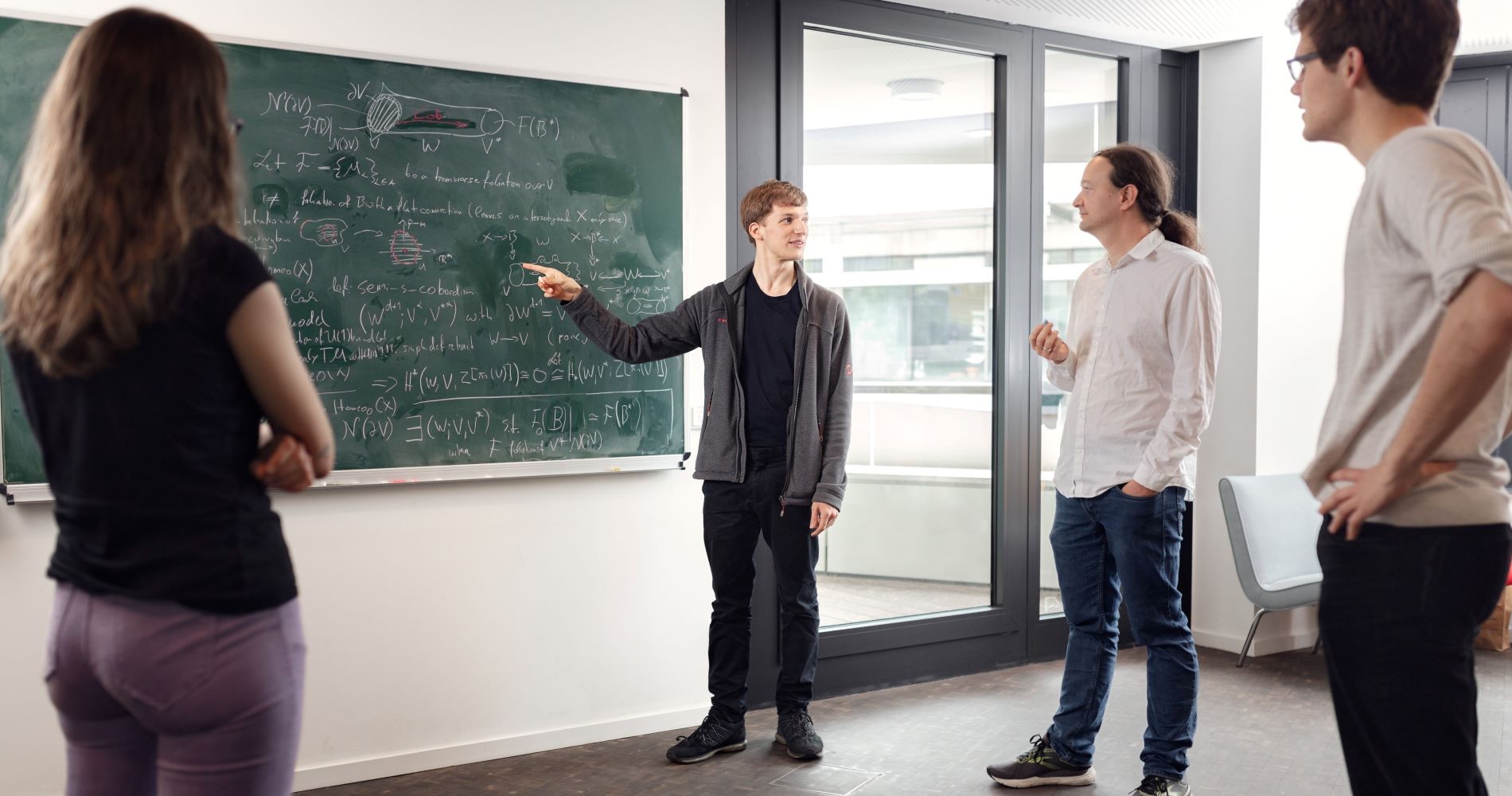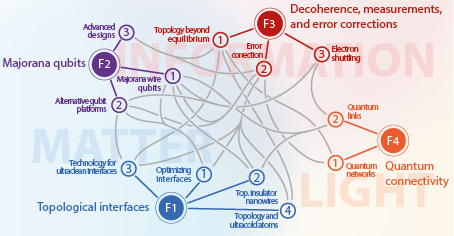Internship program
© JosekDesign
ML4Q Undergraduate Research Internship Program
The ML4Q Undergraduate Research Internship Program aims to raise the interest of talented students in quantum technologies research. It gives an opportunity of hands-on experience in scientific work and an overview of the research performed in the cluster. The interns will work in one of the ML4Q groups under the direct supervision of a postdoc or senior PhD student and the hosting professor. At the same time they are encouraged to take part in seminars and events at the host institute as well as other cluster sites. The ML4Q Research School provides financial support and assistance in administrative issues. Interested students can apply once a year and join the research group of their choice for a 10 -12-week internship during the summer. Please note, we will not offer internships in summer 2026. Below you can find more information about the program and previously offered projects. If you have any further questions do not hesitate to contact the ML4Q Research School coordinator.


Internship projects
Here you can find the projects offered for internships in summer 2025.
Testimonials
Find out how others experienced their internships in our groups!
(c) Image by xvector on Freepik
General overview and useful information
When: 10 -12 weeks from May to July, June to August or July to September – exact dates will be arranged directly between the internee and the host.
Who can apply: Excellent international and German BSc students who have completed at least 4 semesters of physics or related studies by the ginning of the internship. Students in their first year of the Master program are also eligible to apply.
How to apply: Interested students could apply for summer 2025 till November 15th 2024. The decision on admission will be made by mid January. Detailed information can be found in the Application process section.
Support: Accepted students will be offered travel costs reimbursement up to 700 EUR (1000 EUR for overseas applicants) and an internship allowance of 992 EUR per month. The ML4Q Research School will provide help with administrative issues.
Additional useful information
Students from non-German universities will have to enroll as visiting students at the University of Cologne. This will require the submission of additional documents and payment of the semester fee (which allows visiting students to use public transport for free (Deutschlandticket) and university facilities such as canteens and sport centers). We will provide detailed information to the accepted students.
If required, we will assist you in arranging accommodation, e.g. in shared flats or students’ dormitories (if possible). However, students will be responsible for paying their rent. The costs of accommodation vary from city to city, but usually students spend between 500 and 700 EUR on rent per month. Please note, that it is not easy to find the accommodation, so once accepted you should directly start to arrange it. We will provide accepted student with more detailed information on how to proceed.
Please note that you have to make sure you have a valid health insurance in Germany. It is also advisable to also have an accident and personal liability insurance.
Application process
Excellent BSc students are encouraged to apply to our ML4Q Undergraduate Research Internship Program. The call for applications for Internship 2025 is closed now.
Requirements
- At least 4 completed semesters of physics or other relevant program before the internship starts.
- Completed course in quantum mechanics by the internship starting date (additional courses relevant for individual projects are listed in the project descriptions).
- Excellent academic record reflected in overall GPA.
- Proficiency in English corresponding to an IELTS score of at least 6.5 or equivalent (please note you do not need the IELTS certificate to apply).
- Research experience is a plus.
How to apply
To apply for the program please fill in the online form below. In addition to providing the information requested in the form, you will have to upload the following documents combined into a SINGLE PDF file:
- Your CV,
- Motivation letter of max. 1 page (2500 characters)
- Transcript of Records (from your completed semesters, if you just started your MSc program, please submit transcript of your BSc study and list of course to be completed in current semester)
- Contact details (name, academic affiliation, e-mail address) of the academic referee (e.g. professor you took courses with, your program coordinator…) who can provide a letter of reference for you. We will contact this person at the later stage to provide a recommendation letter.
Please make sure that your single PDF file does not exceed 5MB and is named as follows:
yourname_ml4q_internship.pdf (e.g. smith_ml4q_internship.pdf).
If you have any questions, please contact the Research School coordinator.
The applications will be evaluated by the Research School coordinator and the professors offering the project. The evaluation results will be announced to the applicants by mid-January at the latest.
Internship projects 2025
Projects offered for summer 2025. Please note, that in application process you just need to indicate your preferable host and not individual project.
Lie algebra approaches to quantum dynamics
Host: Dr. David Edward Bruschi, Forschungszentrum Jülich
Controlling the dynamics of quantum systems is key to understanding physical processes and phenomena. Quantum dynamics are defined abstractly via the celebrated Schrödinger equation provided in the theory of quantum mechanics. Application of this tool to simple problems provides clear and immediate evidence of the stark difference between the classical and the quantum world. Nevertheless, obtaining explicit expressions once a Hamiltonian that governs the evolution and an initial state of the system are given is usually an extremely hard task. Among the tools available to tackle this problem one finds Lie theory of groups and algebras, which has been recently employed with some success.
In this project we explore the formal aspects of Lie algebraic approaches to time evolution, focusing on mathematical methods and analytical tools. The starting point is the collection of results obtained to date by the project supervisor, which is available as a preprint at . The goals are to build upon these first results and extend the validity to arbitrary sets of generators, to classify the existing finite Hamiltonian algebras, as well as to predict new physical systems with finite Hamiltonian algebras. Partial results as well as results obtained using formal algebraic manipulation software are envisioned as part of the potential outcomes.
Project-specific requirements:
Strong mathematical physics background and interest for formal research. Knowledge of Group Theory, Lie algebras, and Lie groups would be an advantage.
Dynamics of Electronic Transport in One-Dimensional Edge States
Our group focuses on investigating electron transport in quantum conductors at nano- and micrometer scales. In this project, you will study the quantum anomalous Hall effect in thin layers of magnetic topological insulators. These materials exhibit unique quantum mechanical properties, enabling electron transport along the one-dimensional edges of the layer at cryogenic temperatures (T < 100 mK). This environment provides an ideal platform to study one-dimensional electronic transport in detail.
The primary goal is to investigate the dynamic transport on the pico- to nanosecond scale using advanced electronic measurement techniques. Depending on your interests and experience, the project could involve cleanroom fabrication, optimizing and conducting measurements at cryogenic temperatures, or analyzing and modeling data using Python. We are flexible and will adjust the focus of the project to match your background and interests.
Project-specific requirements:
Completed course on quantum mechanics and on electromagnetism.
At least one practical course in experimental physics.
First experience in programming (python) is beneficial but not required.
Josephson Junction Characterization
Host: Daniel Rosenbach (Bocquillon Group), University of Cologne
Embedded within the II. Institute of Physics in the University of Cologne we are investigating Josephson junctions of various types. Experimental techniques include the preparation of devices prior to measurements, the installation of devices in one of our cryogenic measurement setups and participating in electrical measurements at cryogenic temperatures and strong magnetic fields. For measurements we use a dilution refridgerator that reaches temperatures down to 10mK or a cryogenic probe station that reacher liquid helium temperatures (4.2K). Based on your interest and personal background we could discuss how you can contribute to our efforts.
Projects might cover the fabrication of devices in a cleanroom environment, operation and optimization of measurements at cryogenic temperatures, implementation of measurement and analysis routines using python or conceptualizing and testing new components for the measurements setup.
Project-specific requirements:
Completed course on electromagnetism.
At least one practical course in experimental physics.
Experience in numerical programming, especially with Python.
Self-protection in superconducting circuits
Host: Alessandro Ciani, Forschungszentrum Jülich
Superconducting qubits are one of the leading platforms for the realization of a quantum computer.
Several superconducting circuits have been proposed as “protected” qubits, that are resilient against
some environmental noise sources. However, it is still unclear what the correct way of designing selfprotected
qubit is. This project aims at studying how quantum information is preserved over time in
some examples of superconducting qubits that give rise to protected Hamiltonians. In particular,
starting from toy models, the aim is to study systems that can be interpreted as a passive
implementation of an error correcting code [1, 2]. The code perspective allows us to rigorously define
the logical information and to obtain how it evolves in time under the action of external error sources.
[1] M. Rymarz, S. Bosco, A. Ciani & D. DiVincenzo, Phys. Rev. X 11, 011032 (2021)
[2] C. Vuillot, A. Ciani & B. Terhal, Comm. Math. Phys. 405, 53 (2024)
Project-specific requirements:
The project requires basic knowledge of open quantum systems and master equations. Knowledge of
superconducting circuits and error correction is welcome, but not strictly necessary. On the
computational side, the project requires capability of coding in Python or Julia.
Quantum Error Correction
Host: Markus Müller, RWTH Aachen/Forschungszentrum Jülich
Quantum error correcting codes such as the surface code or color codes, but also recently proposed quantum LDPC codes, provide one of the most promising routes towards realizing robust and fault-tolerant quantum computers, currently pursued by academic research groups but also leading tech companies. In this theory internship project, you will first familiarize yourself with the basics of quantum error correction, and then implement, and analytically and numerically benchmark the performance of a quantum error correcting code and decoder that is suitable for a realistic experimental implementation of logical qubits.
Project-specific requirements:
This project requires a solid understanding of quantum mechanics, and so students should have previously taken some course on quantum computing, information and/or algorithms. Additionally, knowledge in numerical programming (e.g. in python, Matlab, C++) would be helpful.
Quantum Neural Networks and Machine Learning
Host: Markus Müller, RWTH Aachen/Forschungszentrum Jülich
Quantum neural networks have been proposed as a computational paradigm to combine benefits such as massive parallel information processing in neural networks with advantages like the computational speedup promised by quantum computers. In this theory internship, you will first familiarize yourself with the basics of quantum neural networks and machine learning. You will then implement a quantum neural network based on a quantum Hopfield, multi-layer or quantum cellular automaton network architecture, and investigate and benchmark its performance for applications such as information storage and retrieval, or for quantum error correction.
Project-specific requirements:
Completed course in quantum mechanics and solid understanding of quantum mechanics.
Completed course on quantum computing and algorithms, and possibly also in machine learning.
Some knowledge in numerical programming (e.g. in python, matlab, C++).
Scalable Quantum Computing with Rydberg Atoms or Ions
Host: Markus Müller, RWTH Aachen/Forschungszentrum Jülich
Qubits encoded in electronic states of neutral atoms or trapped ions constitute highly promising, quickly developing platforms for scalable quantum computing. Atoms or ions can be laser-excited to Rydberg states with strong and long range-interactions, which can be used to realise fast and high-fidelity two- and multi-qubit gate operations between atoms. In this theory internship, you will first familiarize yourself with the basics of quantum computing and algorithms. You will then develop and numerically implement protocols for quantum gate operations between Rydberg atoms or ions, and investigate their expected performance under realistic conditions and noise sources, as building blocks of more complex quantum algorithms.
Project-specific requirements:
Completed course in quantum mechanics and solid understanding of quantum mechanics.
Completed course on atomic physics or quantum optics.
Some knowledge in numerical programming (e.g. in python, matlab, C++).
Spin Qubits in Graphene Quantum Dots
Host: Christan Volk (Christoph Stampfer group), RWTH Aachen
Our research focuses on quantum dots in bilayer graphene. This material platform allows to explore a unique spin-valley physics using coupled electron/hole double quantum dots. We assess the potential of bilayer graphene quantum dots as hosts for valley and spin qubits. So far, we studied e.g. spin and valley relaxation times [1,2] and achieved a spin-valley blockade in an electron/hole double quantum dot [3].
This project aims to characterize the dynamics of spin and valley states. To that end, we will use our state-of-the-art quantum dot devices with capacitively coupled single-electrode transistors acting as charge sensors. A high-frequency reflectometry measurement technique will enhance the readout fidelity. With these techniques, we will determine relevant time scales such as the relaxation time T1 and the dephasing time T2.
Depending on your personal interests, your focus can lie on the device fabrication or on measurements and data analysis. You will gain expertise in high-frequency quantum transport experiments, in the physics of 2D materials and in the relevant fabrication techniques.
[1] Banszerus, Hecker et al., Nature Communications 13, 3637 (2022).
[2] Banszerus, Hecker et al., arXiv: 2402.16691 (2024)
[3] Banszerus, Möller et al., Nature 618, 51 (2023).
Project-specific requirements:
This project requires a good understanding in solid-state physics or 2D materials. Experience in quantum transport measurements or programming in Python is beneficial but not required.
Lineshape calculation for ultraviolet photon condensate
Host: Martin Weitz, Bonn University
Help us realize a photon Bose-Einstein condensate that operates in the ultraviolet spectral regime. Specifically, we offer a project that involves the calculation of the spectral line shapes of a dense mixture of xenon atoms with a lighter noble gas. The noble gas mixture will serve as a thermalization medium for the ultraviolet photon gas trapped in the microcavity in which the photon condensate forms.
Project-specific requirements:
This project requires some knowledge in atomic physics.
